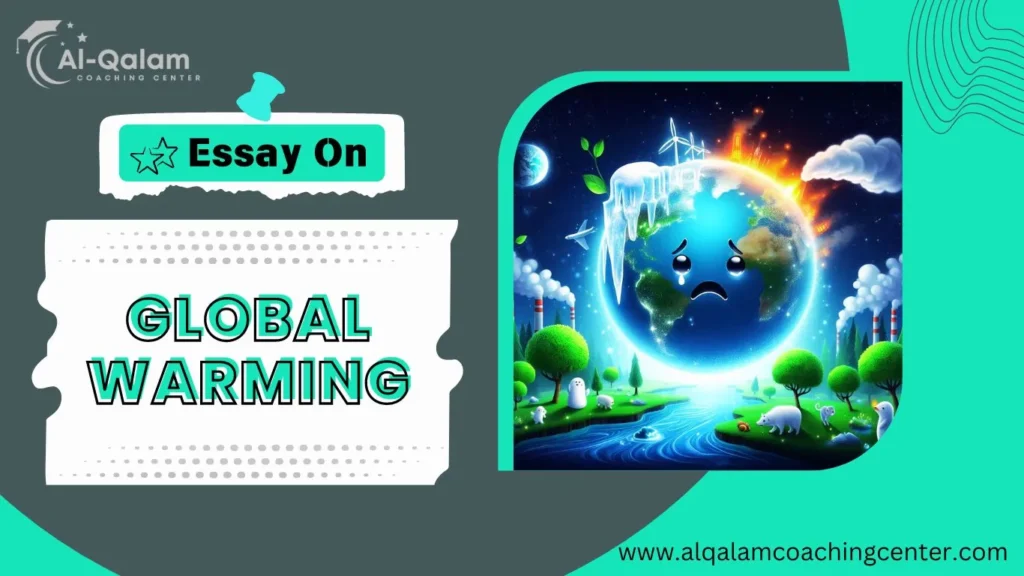Essay On Global Warming

This post is about an Essay on Global Warming in English for FSC/Ics/Fa students. It is a very important essay for Class 10, Class 12, and graduation students. They write it in their annual English paper. A good essay can help them get good marks and improve their rank. You can also see the Essay on Prophet Muhammad(PBUH).
You can use this essay for different topics, such as the causes of global warming, the impact of global warming on the environment and the science behind global warming.
Essay On Global Warming (200 Words)
Global warming is a big problem that has been affecting our planet for many years now. The rise in Earth’s average temperature, on both land and in the oceans, has been noticeable since the mid-20th century and is expected to continue. This has led to warnings from various leaders and scientists about its bad effects.
Cutting down trees is one of the main reasons for global warming. The loss of trees means less carbon dioxide is absorbed and less oxygen is produced. Trees are very important for the environment and our survival. However, we have been misusing natural resources, like petroleum, which is a major cause of global warming.
To solve this problem, we need to find other sources of energy and reduce the use of fossil fuels. It’s important to understand that natural resources are limited, and we must use them carefully. People need to realize that global warming is a real and serious issue that is already affecting our lives in many ways. The temperature rise has caused natural disasters like floods, droughts, hurricanes, and earthquakes.
The time to act is now. The world is getting worse because of the misuse of resources and man-made activities. We must take quick action to stop pollution and protect our planet for future generations. Let’s work together to solve this problem and make sure the world remains a safe and healthy place to live in.
Essay On Global Warming (500 Words)
Introduction to Global Warming
Global warming refers to significant changes in global temperature, precipitation, wind patterns, and other measures of climate that occur over several decades or longer. It is caused by factors such as biotic processes, variations in solar radiation, plate tectonics, and volcanic eruptions. However, the primary cause of recent global warming is emissions of greenhouse gases from human activities like burning fossil fuels, deforestation, and industrial processes.
Greenhouse gases like carbon dioxide, methane, and nitrous oxide trap heat in the atmosphere, leading to an increase in global temperatures. This human-induced global warming has serious impacts on our environment. Some observable effects are rising sea levels, melting glaciers, warming oceans, extreme weather events, extinction of species, declining biodiversity, reduced freshwater availability, and lower crop yields.
Causes of Global Warming
The greenhouse effect is a natural process that warms the Earth’s surface. When sunlight reaches the Earth’s atmosphere, some of it is absorbed by the Earth’s surface and warms it. The remaining energy is radiated back towards space as heat. Greenhouse gases like carbon dioxide, methane, and water vapour absorb this heat and trap it in the atmosphere.
Human activities have increased the levels of these greenhouse gases through:
- Burning of fossil fuels: Coal, oil, and natural gas for energy in industries, transport, heating/cooling systems, etc. About 72% of total greenhouse gas emissions are from fossil fuel combustion.
- Livestock farming and rice cultivation: These release methane. Agricultural soils also release nitrous oxide.
- Deforestation: Activities which deplete forests that would have otherwise absorbed carbon dioxide.
- Manufacturing, mining, and industrial work: These release greenhouse gases.
These human activities have disrupted the natural greenhouse effect leading to global warming.
Impacts of Global Warming
The effects of global warming are global but are not distributed equally. They disproportionately affect developing nations and poor communities due to their low adaptive capacity. Some key impacts are:
- Rise in sea levels: Leads to flooding in coastal areas and erosion. Small island nations are especially threatened.
- Warming oceans and melting glaciers: Impact marine ecosystems. Coral reefs are bleaching, and Arctic habitats are shrinking.
- Increased frequency and severity of extreme weather: Includes heatwaves, droughts, floods, and storms. This affects agriculture, infrastructure, livelihoods, and human health.
- Declining biodiversity: Species struggle to adapt to warmer temperatures and altered habitats, with many facing extinction.
- Reduced freshwater availability: Changes in rainfall patterns and glacier retreat lead to water scarcity, affecting billions globally.
- Lower crop yields and food shortages: As temperatures exceed optimal levels and water scarcity increases, especially in tropical regions.
Fighting Global Warming
Global warming is an urgent global problem. Concerted efforts are required from governments, organizations, and individuals to mitigate and adapt to its impacts. As students, we can:
- Adopt sustainable habits: Use public transport, conserve energy/water, eat less meat, and recycle waste.
- Spread awareness of climate science and its effects through school events, competitions, discussions, etc.
- Participate in rallies, conferences, and social media campaigns demanding climate action.
- Reduce paper usage, plant trees, and clean up local areas. Engage families and friends too.
- Urge leaders to develop policies to cut emissions, incentivize renewables and build climate resilience.
With determination and collective action, we can transition to an eco-friendly world and protect our planet for posterity. But time is running out, so we must act now.
Conclusion
Global warming is the defining crisis of our times. It threatens ecological stability and human societies across the globe. Urgent mitigation and adaptation efforts are required to limit its adverse impacts. As young citizens, our role is crucial – we must adopt sustainable lifestyles, raise awareness on this issue, and demand meaningful action from leaders. With dedication, we have the power to safeguard our planet’s future.
Related Essays
- Essay On Quaid E Azam
- Essay On A Visit To A Historical Place
- Essay On Corruption
- Essay On My Favourite Personality
- Essay On Our Country Pakistan
- Essay On Justice
- Essay On Environment
- Essay On Abdul Sattar Edhi
- Essay On Sports And Games

Usman Mustafvi
He is an SEO lover, educationist, digital marketer, and founder of Al-Qalam Coaching Center & Pen Portal, which is a free online educational services platform. He has been writing on educational topics such as career counselling, study Abroad, exam preparation, and dozens more. His superpower? Helping students ace their exams!
